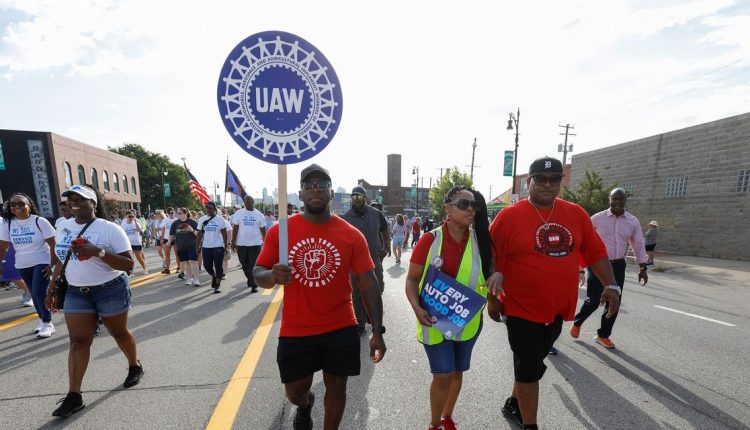United Auto Workers President Shawn Fain said Wednesday that autoworkers and the Big Three automakers are still far apart as negotiations continue, and that the union may strike all of the Big Three at once.
“We’re keeping all of our options open. An all-out strike is still a possibility,” Fain said during a webcast with members, during which he also said the union will not be extending the contracts, which expire at 11:59 p.m. Eastern on Thursday.
The UAW and Ford Motor Co.
F,
General Motors Co.
GM,
and Stellantis NV
STLA,
have made progress during their talks but were still far apart on the union’s key priorities, though negotiations are ongoing, Fain said.
“For the first time in our history, we may strike all of the Big Three at once,” Fain said, adding that he looked at this time as “our defining moment.”
He said if no deal is reached, the union plans to do “standup strikes” at certain plants, which he said is designed to keep the companies guessing. These could escalate and spread elsewhere in order to give the union leverage in bargaining. He told UAW members that they should not strike unless their local is called to do so.
A targeted strike helps the UAW avoid distributing strike pay, set recently at $500 a week per member, to all 150,000 of its members. But it could have a broader effect.
“It is possible for strikes at critical parts plants to have much wider implications,” Marick Masters, a business professor at Wayne State University in Detroit, said in an interview with MarketWatch on Wednesday.
He noted that the 1998 strike against GM, a work stoppage by 9,200 workers at two of that company’s plants in Flint, Mich., resulted in shutdowns that affected more than 150,000 workers.
See: These Ford, GM plants are the most likely strike targets
Jody Calemine, a senior fellow and director of labor and employment policy at the Century Foundation, a progressive think tank, said Wednesday that the union is employing an interesting strategy.
“It will turn the screws slowly and probe for weaknesses, and try to get as much movement out of companies as possible while keeping the options to escalate,” he said.
Calemine said Fain has done a “masterful job” of painting the fight as a “real showdown” between working families and the companies. On Wednesday, Fain said the union has been accused of “class warfare,” but that “the billionaire class has been taking everything” for the last 40 years.
But Calemine added that “the principal danger for the union would be losing the narrative. Other places would continue to work, or get laid off or locked out.”
That’s reflected in some of the online comments by UAW members who watched Fain’s update. One worker said on Facebook: “Strike us all or none at all.”
The UAW president quoted scripture, repeated his calls for unity and said the “strike plan is driven by faith that together we can and will move mountains.”
Fain said the companies have revised some of their offers: On wages, Ford has put forward a 20% increase over the life of the four-year contract, up from its previous offer of 9%, while GM’s latest offer is 18% and Stellantis’s offer is 17.5%. That’s compared to a wage increase of 40% — or 46% when compounded annually — that the union sought originally and later revised to 36%.
“Their proposals don’t reflect the massive profits that we’ve generated for these companies,” Fain said.
The union has pointed out that while the Big Three’s profit has risen 65% over the past four years, and the pay of each of the companies’ chief executives have risen 40%, the UAW top wage rate has risen 6% over that time.
See: Why United Auto Workers are fighting to end a two-tier system for wages and benefits
A GM spokesperson said Wednesday that the company continues to bargain in good faith and sent a statement that reads in part: “We are making progress in key areas that we believe are most important to our represented team members. This includes historic guaranteed annual wage increases, investments in our U.S. manufacturing plants to provide opportunities for all, and shortening the time for in-progression employees to reach maximum wages.”
A spokesperson for Stellantis said the company is still waiting for the UAW’s response to its latest offer. “Our focus remains on bargaining in good faith to have a tentative agreement on the table before the collective bargaining agreement expires,” the spokesperson said.
Ford did not immediately return a request for comment.
The most recent U.S. autoworkers’ strike was at GM in 2019, which lasted for nearly six weeks and involved about 50,000 workers.
See: Would a United Auto Workers strike provide an opportunity for Tesla — and push up used-car prices?
Read the full article here

